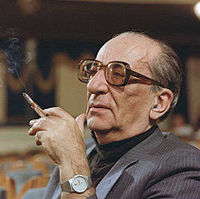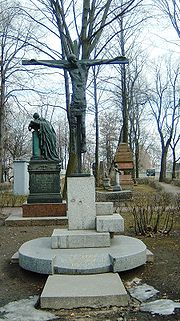
Georgy Tovstonogov
Encyclopedia

Russia
Russia or , officially known as both Russia and the Russian Federation , is a country in northern Eurasia. It is a federal semi-presidential republic, comprising 83 federal subjects...
n theatre director, the leader of Saint Petersburg
Saint Petersburg
Saint Petersburg is a city and a federal subject of Russia located on the Neva River at the head of the Gulf of Finland on the Baltic Sea...
Bolshoi Academic Theatre of Drama (formerly Gorky Theater), which now bears his name.
Biography
Georgy Tovstinogov was born in TbilisiTbilisi
Tbilisi is the capital and the largest city of Georgia, lying on the banks of the Mt'k'vari River. The name is derived from an early Georgian form T'pilisi and it was officially known as Tiflis until 1936...
, Russian Empire
Russian Empire
The Russian Empire was a state that existed from 1721 until the Russian Revolution of 1917. It was the successor to the Tsardom of Russia and the predecessor of the Soviet Union...
(now Georgia
Georgia (country)
Georgia is a sovereign state in the Caucasus region of Eurasia. Located at the crossroads of Western Asia and Eastern Europe, it is bounded to the west by the Black Sea, to the north by Russia, to the southwest by Turkey, to the south by Armenia, and to the southeast by Azerbaijan. The capital of...
) on September 28, 1915, to a Russian noble and a Georgian classical singer Tamara Papitashvili.
In 1938 he graduated from State Institute of Theatrical Art in Moscow
Moscow
Moscow is the capital, the most populous city, and the most populous federal subject of Russia. The city is a major political, economic, cultural, scientific, religious, financial, educational, and transportation centre of Russia and the continent...
. In 1938-1946 worked as a director in Tbilisi Griboedov Theater, in 1946-1949 in Central Children's Theater in Moscow, 1950-1956 Leningrad
Saint Petersburg
Saint Petersburg is a city and a federal subject of Russia located on the Neva River at the head of the Gulf of Finland on the Baltic Sea...
Leninsky Komsomol Theater, since 1956 until his death in 1989 in Bolshoi Academic Gorky Theater. He was a Professor of Leningrad Institute for Theatre, Music and Cinema since 1960. In 1957 he became People's Artist of the USSR
People's Artist of the USSR
People's Artist of the USSR, also sometimes translated as National Artist of the USSR, was an honorary title granted to citizens of the Soviet Union.- Nomenclature and significance :...
, he won Stalin Prize thrice (1950, 1952, 1956), got two Order of Lenin
Order of Lenin
The Order of Lenin , named after the leader of the Russian October Revolution, was the highest decoration bestowed by the Soviet Union...
s and many other Soviet awards. On May 23, 1989 Tovtonogov died of heart attack
Myocardial infarction
Myocardial infarction or acute myocardial infarction , commonly known as a heart attack, results from the interruption of blood supply to a part of the heart, causing heart cells to die...
in his car returning home after general rehearsal of his new production The Visit
The Visit
The Visit is a 1956 tragicomic play by Swiss dramatist Friedrich Dürrenmatt.-Plot summary:...
by Friedrich Dürrenmatt
Friedrich Dürrenmatt
Friedrich Dürrenmatt was a Swiss author and dramatist. He was a proponent of epic theatre whose plays reflected the recent experiences of World War II. The politically active author's work included avant-garde dramas, philosophically deep crime novels, and often macabre satire...
. In 1972, he produced the book The Profession of the Stage-Director, which is the best example of his directing style, in the book he shares his honest opinions on Lee Strasberg
Lee Strasberg
Lee Strasberg was an American actor, director and acting teacher. He cofounded, with directors Harold Clurman and Cheryl Crawford, the Group Theatre in 1931, which was hailed as "America's first true theatrical collective"...
and Konstantin Stanislavsky.
Main Works

Fyodor Dostoevsky
Fyodor Mikhaylovich Dostoyevsky was a Russian writer of novels, short stories and essays. He is best known for his novels Crime and Punishment, The Idiot and The Brothers Karamazov....
into Soviet theater, by his productions of The Insulted and Humiliated
The Insulted and Humiliated
Humiliated and Insulted is a novel by Fyodor Dostoyevsky, first published in 1861 in the monthly magazine Vremya.-Plot introduction:...
(1956 in Leningrad Leninsky Komsomol Theater) and The Idiot
The Idiot (novel)
The Idiot is a novel written by 19th century Russian author Fyodor Dostoyevsky. It was first published serially in The Russian Messenger between 1868 and 1869. The Idiot is ranked beside some of Dostoyevsky's other works as one of the most brilliant literary achievements of the "Golden Age" of...
(1957 in Gorky Theater).
Among other famous performances are:
- The Three Sisters 1965 and Uncle VanyaUncle VanyaUncle Vanya is a play by the Russian playwright Anton Chekhov. It was first published in 1897 and received its Moscow première in 1899 in a production by the Moscow Art Theatre, under the direction of Konstantin Stanislavski....
(1982) by Anton ChekhovAnton ChekhovAnton Pavlovich Chekhov was a Russian physician, dramatist and author who is considered to be among the greatest writers of short stories in history. His career as a dramatist produced four classics and his best short stories are held in high esteem by writers and critics... - Five evenings 1958 and My big sister 1961 by Alexander Volodin
- Irkusk Story by A. N. Arbuzov 1960
- Wit Works Woe 1962 by Alexander Griboedov
- Barbarians (1959) and Meschane (1966) by Maxim GorkyMaxim GorkyAlexei Maximovich Peshkov , primarily known as Maxim Gorky , was a Russian and Soviet author, a founder of the Socialist Realism literary method and a political activist.-Early years:...
- Once again about Love (1964) by Edvard RadzinskyEdvard RadzinskyEdvard Stanislavovich Radzinsky is a Russian playwright, writer, TV personality, and film screenwriter. He is also known as an author of several books on history which were characterized as "folk history" by journalists and academic historians.-Biography:Edvard Stanislavovich Radzinsky was born...
- Henry IVHenry IV, Part 1Henry IV, Part 1 is a history play by William Shakespeare, believed to have been written no later than 1597. It is the second play in Shakespeare's tetralogy dealing with the successive reigns of Richard II, Henry IV , and Henry V...
(1969) by William ShakespeareWilliam ShakespeareWilliam Shakespeare was an English poet and playwright, widely regarded as the greatest writer in the English language and the world's pre-eminent dramatist. He is often called England's national poet and the "Bard of Avon"... - Revisor by Nikolay Gogol (1972)
- Last summer in Chulimsk by Alexander VampilovAlexander VampilovAlexander Valentinovich Vampilov was a Russian playwright. His play Elder Son was first performed in 1969, and became a national success two years later. Many of his plays have been filmed or televised in Russia...
(1974) - Energetic people by Vasily ShukshinVasily ShukshinVasily Makarovich Shukshin was a notable Soviet/Russian actor, writer, screenwriter and movie director from the Altay region who specialized in rural themes. Upon his death, Shukshin was interred at Novodevichy Cemetery in Moscow.-Biography:...
(1974) - History of a Horse after Leo TolstoyLeo TolstoyLev Nikolayevich Tolstoy was a Russian writer who primarily wrote novels and short stories. Later in life, he also wrote plays and essays. His two most famous works, the novels War and Peace and Anna Karenina, are acknowledged as two of the greatest novels of all time and a pinnacle of realist...
's KholstomerKholstomer"Kholstomer", also translated as "Strider", is one of the most striking stories in Russian literature. It was started by Leo Tolstoy in 1863 and left unfinished until 1886, when it was reworked and published as "Kholstomer: The Story of a Horse". Georgi Tovstonogov staged it in his theatre in 1975....
(1975)
and many others.
He was also responsible for producing mass spectacle
Spectacle
In general, spectacle refers to an event that is memorable for the appearance it creates. Derived in Middle English from c. 1340 as "specially prepared or arranged display" it was borrowed from Old French spectacle, itself a reflection of the Latin spectaculum "a show" from spectare "to view,...
s.
During his prime Tovstonogov was considered one the best theatre directors of Europe.
The prominent members of his troupe include Alice Freindlich, Zinaida Sharko, Lyudmila Makarova, Tatiana Doronina
Tatiana Doronina
Tatiana Vasilyevna Doronina is a popular Soviet/Russian actress who has performed in movies and the theater. She is generally regarded as one of the most talented actresses of her generation and was named a People's Artist of the USSR in 1981....
, Svetlana Kryuchkova, Kirill Lavrov
Kirill Lavrov
Kirill Yuryevich Lavrov was a well-known Soviet and Russian film and theatre actor and director.-Childhood:Kirill Yuryevich Lavrov was born on September 15, 1925, in Leningrad, USSR . He was baptized by the Russian Orthodox Church of St. John the Divine in Lavrushinskoe Podvorie Monastery in...
, Innokenty Smoktunovsky
Innokenty Smoktunovsky
Innokentiy Mikhailovich Smoktunovsky was a Soviet actor acclaimed as the "king of Soviet actors". He was named People's Artist of the USSR in 1974 and the Hero of Socialist Labour in 1990....
, Pavel Luspekaev, Yefim Kopelyan
Yefim Kopelyan
Yefim Zakharovich Kopelyan was a Soviet actor of theater and cinema, one of the legendary masters of the Bolshoi Theatre of Drama . He performed the bright characteristic roles in the films The Elusive Avengers, Intervention, Eternal call, Straw cap, read author's text in the television series...
, Sergey Yursky, Vladislav Strzhelchik, Еvgeny Lebedev, and Oleg Basilashvili
Oleg Basilashvili
Oleg Valerianovich Basilashvili is a well-known Soviet/Russian film and theatre actor of Georgian and Polish origin, as well as political figure in the former Soviet Union and in the new Russia.-Childhood:...
. His contribution to the Russian tradition of theatre education is important, especially where it comes to education of theatre directors. His theories continue to have large influence, especially in Russian and Scandinavian theatre education.

